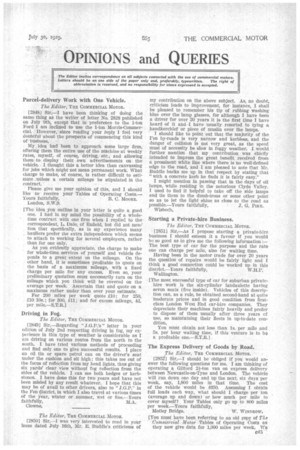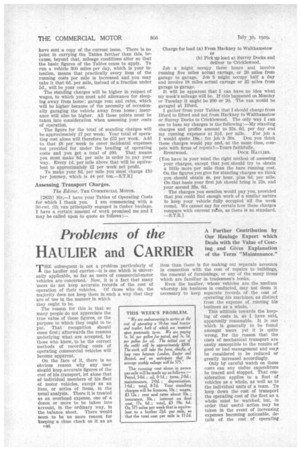OPINIONS and QUERIES
Page 67

Page 68

If you've noticed an error in this article please click here to report it so we can fix it.
The Editor invites correspondence on all subjects connected with the use of commercial motors.
Letters should be on one side of the paper only and, preferably, typewritten. The right of abbreviation is reserved, and no responsibility for views expressed is accepted.
Parcel-delivery Work with One Vehicle.
The Editor, TaE COMMERCIAL MOTOR.
[28481 Sir,-1 have been thinking of doing the same thing as the writer of letter No. 2828 published on July 9th, except that in preference to the 1-ton Ford I am inclined to use the 1-ton Morris-C,onamercial. However, since reading your reply I feel very doubtful about the prospects of commencing this kind of business.
My , idea had been to approach some large firm, offering them the entire use of the machine at weekly rates, myself, of course, driving, etc., and allowing them to display their own advertisements on the vehicle. I thought this a better idea than canvassing for jobs which might not mean permanent work. What charge to make, of course, is rather difficult to estimate .unless a certain mileage be stipulated in the contract.
' Please give me your opinion of this, and I should like to receive your Tables of Operating Costa.—
Yours faithfully, B. C. MOORE. London, S.W.9.
[The idea you outline in your letter is quite a good one. I had in my mind the possibility of a wholetime contract with one firm when I replied to the correspondent, L. Dale, of Enfield, but did not mention that specifically, as in my experience many hauliers prefer the extra independence which seems to attach to working for several employers, rather than for one only.
As you evidently appreciate, the charge to make for whole-time services of yourself and vehicle depends to a great extent on the mileage. On the other hand, it is sometimes profitable to quote on the basis of a maximum mileage, with a fixed charge per mile for any excess. Even so, your preliminary quotation must necessarily turn on the mileage which you think will be covered on the average per week. Ascertain that and quote on a maximum rather under than over your estimate.
For 200 miles per week quote £10; for 250, 110 10s.; for 300, £11; and for excess mileage, 4d. per mile.—S.T.R.]
Driving in Fog.
The Editor, THE COMMERCIAL MOTOR.
12849] Sir,—Regarding " J.G.P.'s " letter in your edition of July 2nd respecting driving in fog, my experience in this type of weather is considerable as I am driving on various routes from the north to the south. I have tried various methods of proceeding and find only one to give successful results. I place an oil tin or spare petrol can on the driver's seat under the cushion and sit high; this takes me out of the focus of reflection from my head lights, thus giving six yards' clear view without fog reflection from the sides of the vehicle. I can see both hedges or kerbstones. I have done this for two years and have not been misled by any result whatever. I hope that this may be of avail to other drivers, also to " J.G.P." in the Fen district, in which I also travel at various times of the year, winter or summer, wet or fine.—Yours
faithfully, MA. Clowne,
The Editor, THE COMMERCIAL MOTOR.
[2850] Sir,—I was very interested to read in your issue dated July 16th, Mr, E. Buddle's criticisms of
my contribution on the above subject. As, no doubt, criticism leads to improvement, for instance, I shall be pleased to remember his tip of rubbing washing blue over the lamp glasses, for although I have been a driver for over 20 years it is the first time I have heard of it anti--I have usually resorted to tying a handkerchief or piece of muslin over the lamps.
I should like to point out that the majority of the Fen by-roads is very narrow and kerbless, and the danger of collision is not very great, as the speed must of necessity be slow in foggy weather. I worild further mention that my contribution was chiefly intended to impress the great benefit received from a prominent white line where there is no well-defined edge to the road, and I am pleased to note that Mr. Buddle backs me up in that respect by stating that " with a concrete kerb he finds it is fairly easy."
I might mention in passing that in the days of oil lamps, while residing in the notorious Clyde Valley, I used to find it helpful to take off the side lamps and tie them to the dumb-irons or some other point so as to let the light shine as close to the road as possible.—Yours faithfully, J. G. PIKE. Wisbech,
Starting a Private-hire Business.
The Editor, THE COMMERCIAL MOTOR.
[2851] Sir,—As I propose starting a private-hire business I should esteem it a favour if you would be so good as to give me the following information:— The best type of car for the purpose and the rate one can charge per mile, also for waiting time.
Having been in the motor trade for over 20 years the question of repairs would be fairly light and I think a good connection cotild be worked up in this district.—Yours faithfully, W.H.P. Wallington.
[The most successful type of car for suburban privatehire work is the six-cylinder landaulette having seven seats (five inside). Vehicles of this description can, as a rule, be obtained second-band at quite moderate prices and in good condition from firstclass London West End car-hire companies. They depreciate their machines fairly heavily and prefer • to dispose of them usually after three years of use, so maintaining their fleets in up-to-date condition, You must obtain not loss than is. per mile and 5s. per hour waiting time, if this venture is to be a profitable one.—S.T.R.]
The Express Delivery of Goods by Road.
The Editor, THE COMMERCIAL MOTOR.
[2852] Sir,—I should be obliged if you would answer the following questions for me. I am thinking of operating a Gilford 2/--ton van on express delivery between Newcastle-on-Tyne and London. The vehicle will run down one day and up the next, six days per week, say, 1,800 miles in that time. The cost of the vehicle would be £650. Assuming I obtain full loads each way, what should I •charge per ton (average up and down) or how much per mile to cover myself? Your Tables only go up to 800 miles per week.—Yours faithfully,
Motley Bridge. W. Wnionow.
[You must have been referring to an old copy of The Commercial Motor Tables of Operating Costs as they now give data for 1,000 miles per week. We 045
have sent a copy of the current issue. There is no point in carrying the Tables farther than this, because, beyond that, mileage conditions alter so that the basic figures of the Tables cease to apply. To run a vehicle 300 miles per day, which is your intention, means that practically every item of the running costs per mile is increased and you may take it that 6d. per mile, instead of a fraction under 5d., will be your cost.
The standing charges will be higher in respect of wages, to which you must add allowance for sleeping away from home; garage rent and rates, which will be higher because of the necessity of occasionally garaging the vehicle away from home; insurance will also be higher. All these points must be taken into consideration when assessing your costs of operation, The figure for the total of standing charges will be approximately £7 per week. Your total of operating cost alone will therefore be £52 per week. Add to that £8 per week to cover incidental expenses not provided for under the heading of operating costs and you get a total of £60. That means you must make 8d. per mile in order to pay your way. Every id. per mile above that will be equivalent to approximately £2 per week net profit.
To make your 8d. per mile you must charge £10 per journey, which is £4 per ton.-S.T.13.]
Assessing Transport Charges.
The Editor, THE COMMERCIAL MOTOR.
[2853] Sir,-I have your Tables of Operating Costs for which I thank you. I am commencing with a 30-cwt. tilt van principally engaged in timber haulage. I have a certain amount of work promised me and I may be called upon to quote as follows:
Charge for load (a) From Hackney to Walthainstow or (b) Pick up load at Surrey Docks and deliver to Cricklewood.
JO a might occupy three hours and involve running five miles actual cartage, or 20 miles from garage to garage. Job b might occupy half a day and involve 18 miles actual cartage or 35 miles from garage to garage.
It will be apparent that I can have no idea what my week's mileage will be. If this happened on Monday or Tuesday it might be 200 or 20. The van wotild be garaged at Ilford.
I gather from your Tables that I should charge from Mord to Ilford and not from Hackney to Walthamstow Or Surrey Docks to Cricklewood. The only way I can see to base my charges is the following :-My standing charges and profits amount to 32s. 6d. per day and my running expenses at 31d. per mile. For job a I would quote 18s.; for job b 30s. Dou you think these charges would pay and, at the same time, compete with firms of repute?-Yours faithfully. Brentwood. DOCK ItAITLIER.
[You have in your mind the right method of assessing ' your charges, except that you should try to obtain a little more per mile than the bare running cost. On the figures you give for standing charges we think you should obtain 4s. per hour, plus 6[1. per mile. On that basis your first job should bring in 22s. and your second 33s. 6d, The Charges you mention would pay you, provided that you could find enough work of .a similar nature to keep your vehicle fully occupied all the week round. We cannot say for certain how these charges compare with current rates, as there is no standard. --S.T.R.]












































































































